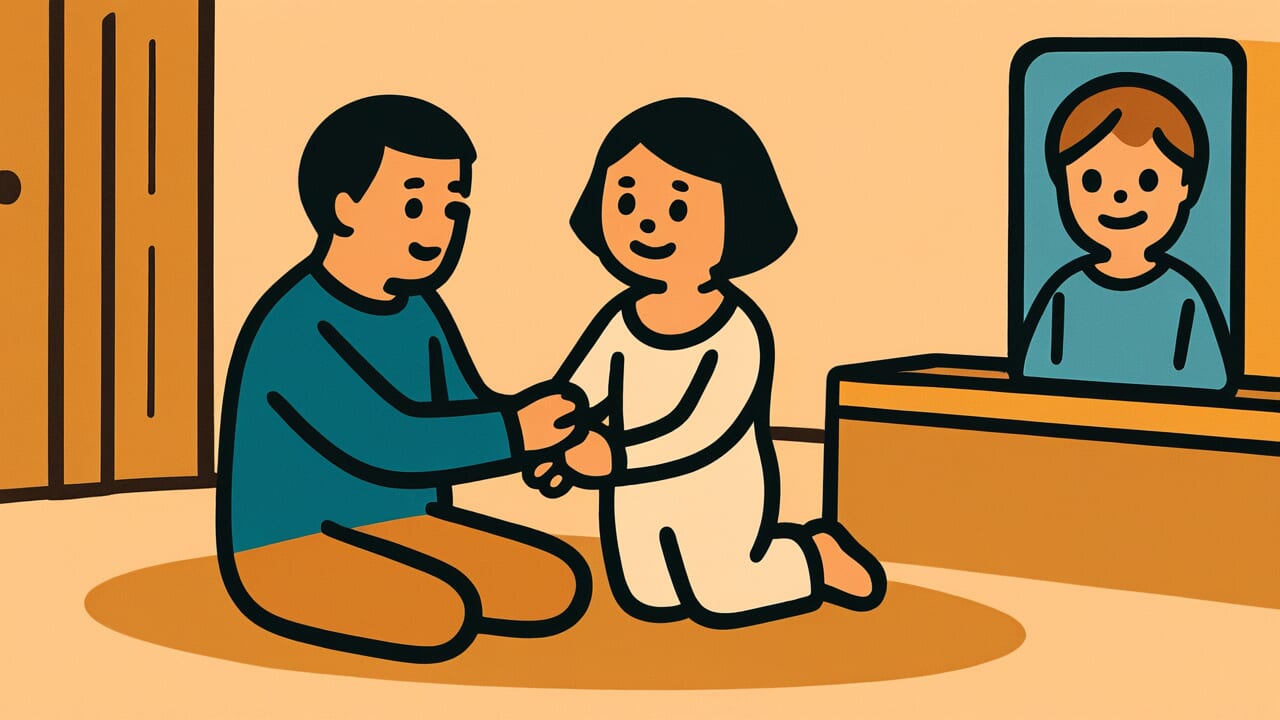How to Read “The parent is the parent, the child is the child”
Oya mo oya nari ko mo ko nari
Meaning of “The parent is the parent, the child is the child”
“The parent is the parent, the child is the child” means that parents have their own position and role, while children have their own position and role.
This proverb teaches the importance of understanding your place in the family and fulfilling that role.
People use this saying when parents interfere too much in their children’s lives or step into their children’s territory.
It also applies when children meddle too much in their parents’ affairs.
Parents have responsibilities as parents—raising children and protecting the family. Children have responsibilities as children—growing and learning.
When everyone fulfills their own role, the whole family functions well.
Even today, this phrase reminds us how important it is to maintain proper boundaries between generations.
Respecting each other’s position and fulfilling your own responsibilities forms the foundation of healthy relationships.
Origin and Etymology
The exact first appearance of this proverb in literature is unclear. However, people believe it was used among common folk during the Edo period.
Looking at the structure, it forms a parallel phrase: “the parent is the parent” and “the child is the child.” Both parts affirm each existence.
The word “nari” is particularly interesting. In classical Japanese, “nari” expresses assertion and affirmation of existence.
It means “to be that thing.” So this proverb expresses the idea that “the parent exists as a parent” and “the child exists as a child.”
It recognizes and accepts each person’s position.
Traditional Japanese family views often saw the parent-child relationship as hierarchical. But this proverb offers a slightly different perspective.
Parents have their role, and children have theirs. Neither is above or below the other.
Each should fulfill their responsibilities in their own position.
In Japanese society influenced by Confucian thought, people often discussed parent-child relationships through the concept of “filial piety.”
However, this proverb suggests a more equal and mutually respectful relationship.
It may have been a crystallization of practical wisdom born from the lives of ordinary people.
Usage Examples
- Raising children is the parents’ responsibility, but choosing a career path is for the child to decide. The parent is the parent, the child is the child, after all.
- The parent is the parent, the child is the child—perhaps all we can do is watch over them.
Universal Wisdom
The universal wisdom in “The parent is the parent, the child is the child” is about the importance of boundaries in human relationships.
Why do people cross boundaries especially with those they love? Because the deeper the love, the more we feel the other person is part of ourselves.
Parents want their children to be happy so much that they try to control their children’s lives.
Children feel grateful or worried about their parents, so they interfere in how their parents should live.
This proverb has been passed down through generations because people fundamentally understood a truth.
You can only fulfill true responsibility by completing your own role.
No matter how much parents try to live for their children, they cannot walk their children’s lives for them.
No matter how much children care about their parents, they cannot make life choices for their parents.
This wisdom deals with the eternal theme of human relationships: the balance between love and independence.
Because you care about someone, you respect their territory. When everyone does their best in their own position, harmony naturally emerges.
Our ancestors understood that true love comes not from control, but from mutual respect.
When AI Hears This
When we view parents and children as separate complex systems, something interesting emerges.
In complexity science, systems have a property: even when external forces act on them, they eventually settle into their own stable state.
We call this an “attractor.”
Think about a water vortex. No matter how you initially stir the water, the vortex eventually converges into a certain shape.
Parent-child relationships are similar. Parents try to pass on values and habits to their children.
But the child as a complex system operates with countless interacting elements: genetic information, friendships, social environment, random events.
As a result of these vast interactions, children are influenced by their parents but ultimately get drawn to “the child’s unique attractor.”
What’s fascinating is that even when parental education is a strong input, the output varies greatly depending on the child’s internal structure.
Chaos theory tells us that tiny differences in initial conditions produce completely different results.
Siblings raised by the same parents develop completely different personalities because each is an independent complex system with different attractors.
In other words, parents and children give perturbations to each other while each converges on their own unique trajectory.
This dual independence is the deep insight this proverb reveals.
Lessons for Today
This proverb teaches modern people about the balance between love and boundaries.
Are you getting too deeply involved in someone else’s life right now? Or are you abandoning your own role and depending too much on someone else?
In modern society, this wisdom applies not just to parent-child relationships but to many others.
Bosses and subordinates at work, seniors and juniors, teachers and students—all these relationships can benefit from this wisdom.
Each position has its own responsibilities and authority. Bosses shouldn’t take away their subordinates’ work.
Subordinates need to respect their bosses’ decisions.
What matters is trusting and entrusting others. Parents trust and watch over their children.
Children respect their parents’ choices. This isn’t coldness—it’s a deep expression of love that wishes for the other’s growth.
When you fulfill your own role, you create an environment where others can fulfill theirs too.
When everyone shines in their own place, overall harmony follows.



Comments